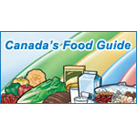The “formula” for a peak performance diet is no secret. Canada’s Food Guide is the starting point to plan food choices.
The “formula” for a peak performance diet is no secret. Canada’s Food Guide is the starting point to plan food choices.
- Choose at least the recommended number of Food Guide Servings suggested in each food group every day for basic healthy eating (see table below).
- Choose more servings of Vegetables & Fruit and Grain Products to meet the higher energy needs associated with strenuous activity. These food groups provide the carbohydrate for muscle fuel.
- Choose a variety of foods from each group every day as no single food or food group supplies all the nutrients athletes and active individuals need. Remember that pills, powders or nutritional supplements cannot replace food.
RECOMMENDED NUMBER OF FOOD GUIDE SERVINGS PER DAY |
||||||
FOOD GROUP |
TEENS |
ADULTS (19-50 years) |
ADULTS (51+ years) |
|||
Female |
Male |
Female |
Male |
Female |
Male |
|
VEGETABLES & FRUIT |
7 | 8 | 7–8 | 8–10 | 7 | 7 |
GRAIN PRODUCTS |
6 | 7 | 6–7 | 8 | 6 | 7 |
MILK & ALTERNATIVES |
3–4 | 3–4 | 2 | 2 | 3 | 3 |
MEAT & ALTERNATIVES |
2 | 3 | 2 | 3 | 2 | 3 |
Vegetables & Fruit
Examples of 1 Food Guide Serving
- 1⁄2 cup (125 mL) fresh, frozen or canned vegetables or fruit
- 1 medium piece fruit or vegetable
- 1 cup (250 mL) raw leafy greens
- 1⁄2 cup (125 mL) 100% juice
“Nature’s Vitamin Pill”, these foods are excellent sources of vitamins, minerals and other health protectors that can aid muscle repair.
Eat at least one dark green and one orange vegetable each day.
Grain Products
Examples of 1 Food Guide Serving
- 1 slice of bread
- 1⁄2 cup (125 mL) cooked rice or pasta
- 1⁄2 bagel or flatbread
- Cereal: 1 oz (30 g) cold; 3⁄4 cup (175 mL) hot
The carbohydrates in grain products are an important muscle fuel source for exercise and essential for recovery.
Make at least half of your grain products whole grain each day.
Milk & Alternatives
Examples of 1 Food Guide Serving
- 1 cup (250 mL) milk
- 3⁄4 cup (175 mL) yogurt
- 1 1⁄2 oz (50 g) cheese
The carbohydrate-to-protein ratio and fluid in chocolate milk make it a great recovery beverage.
Drink skim, 1% or 2% milk each day; drink fortified soy beverage if you do not consume milk.
Meat & Alternatives
Examples of 1 Food Guide Serving
- 2 1⁄2 oz (75 g) cooked fish, shellfish, poultry or lean meat, cooked
- 3⁄4 cup (175 mL) cooked legumes or tofu
- 2 eggs
- 2 Tbsp. (30 mL) peanut butter or other nut butter
- 1⁄4 cup (60 mL) shelled nuts or seeds
These foods provide protein—essential for building and repairing muscle and other tissue. The iron in red meat is well absorbed and legumes are a great source of carbohydrate.
Have meat alternatives (beans, lentils and tofu) often. Eat at least 2 Food Guide Servings of fish each week.
Limit Consumption of…
Foods that contain energy, but provide little nutrition, such as:
- cakes, pastries, candy, chocolate, donuts, ice cream and frozen desserts
- french fries, potato chips, nachos
- other salty or high fat snacks
- soft drinks
